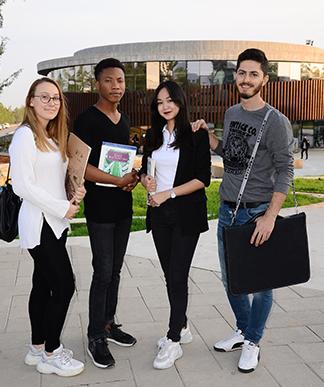


About the Program
During the course of this training, TRNC Law is taught and it is aimed to help student improve themselves in the academic sense. The main reason for launching this program is to train lawyers who follow the developments and innovations in the national and international area and who can bring up solution proposals for the problems that may arise in this area and the techniques and methods of scientific research. Students participating in the program will have the opportunity to refresh the knowledge they have gained during their undergraduate education or to learn any missing information, as well as having the opportunity to specialize in the field by taking advantage of the extensive course schedules of the program.
Education Opportunities
The Master of Law (English) program ensures that students will be able to step confidently in the future for their careers. The reason for this is that Law (English) Master's Program offers legal education within a period of 2 years allowing students to work and study at the same time. Especially, if you are thinking about continuing for doctoral studies, it is possible to participate in various academic studies and have the chance to improve your English language skills.

Career Areas
There are many options of employment for graduates with a degree in law. Students who have graduated from the Law (English) Master’s Program may become governors, notaries, district governors, undersecretaries, inspectors, officials of state institutions, directors in the field of private law and administrators at the Competition Authority, Central Bank, or private law firms; as well as being able to work as consultants, experts or higher authorities. They can also pursue a Ph.D. degree to pursue an academic career.
Contact
Institute of Graduate Studies and Research
Graduate Sciences and Education Center, GE106
Tel: +90 392 671 1111 Extension: 2776
Institute E-mail: ciu-institute@ciu.edu.tr
Compulsory Courses
First Semester
ADVANCED LEGAL WRITING: ARGUMENT, ADVOCACY, DRAFTING
Course code
ILAW503Credit
3Theoretical
3Practical
0Ects
8SEMINAR
Course code
ILAW590Credit
0Theoretical
0Practical
0Ects
4ELECTIVE
Course code
ILAW5X1Credit
3Theoretical
3Practical
0Ects
8ELECTIVE
Course code
ILAW5X2Credit
3Theoretical
3Practical
0Ects
8ELECTIVE
Course code
ILAW5X3Credit
3Theoretical
3Practical
0Ects
8Second Semester
THESIS
Course code
ILAW500Credit
0Theoretical
0Practical
0Ects
60ADVANCED LEGAL RESEARCH
Course code
ILAW502Credit
3Theoretical
3Practical
0Ects
8ELECTIVE
Course code
ILAW5X4Credit
3Theoretical
3Practical
0Ects
8ELECTIVE
Course code
ILAW5X5Credit
3Theoretical
3Practical
0Ects
8Elective Courses
EUROPEAN UNION LAW
Course code
ILAW508Credit
3Theoretical
3Practical
0Ects
INTERNATIONAL CRIMINAL LAW
Course code
ILAW509Credit
3Theoretical
3Practical
0Ects
INTERNATIONAL TRADE
Course code
ILAW510Credit
3Theoretical
3Practical
0Ects
BIOETHICS AND THE LAW
Course code
ILAW516Credit
3Theoretical
3Practical
0Ects
0TAX LAW, FINANCE AND STRATEGY
Course code
ILAW515Credit
3Theoretical
3Practical
0Ects
RETHINKING SOVEREIGNTY UNDER INTERNATIONAL LAW
Course code
ILAW523Credit
3Theoretical
3Practical
0Ects
INTERNATIONAL TAXATION
Course code
ILAW511Credit
3Theoretical
3Practical
0Ects
INTERNATIONAL LAW: THE LAW OF WAR
Course code
ILAW512Credit
3Theoretical
3Practical
0Ects
COMPARATIVE CONSTITUTIONAL LAW
Course code
ILAW525Credit
3Theoretical
3Practical
0Ects
0LAW AND SOCIAL CHANGE
Course code
ILAW513Credit
3Theoretical
3Practical
0Ects
LEGAL ETHICS
Course code
ILAW514Credit
3Theoretical
3Practical
0Ects
CIVIL RIGHTS LITIGATION
Course code
ILAW504Credit
3Theoretical
3Practical
0Ects
CHILDREN IN CONFLICT WITH THE LAW
Course code
ILAW505Credit
3Theoretical
3Practical
0Ects
CURRENT WORLD EVENTS
Course code
INRE534Credit
3Theoretical
3Practical
0Ects
INTERNATIONAL ORGANIZATIONS AND GLOBALIZATION
Course code
INRE548Credit
3Theoretical
3Practical
0Ects
Students who are interested in pursuing advanced graduate studies leading to a master’s, doctoral degree, or professional doctorate degree for the Fall and Spring semesters every year. Applicants can directly apply online to our graduate programs using the application portal.
TRNC Applicants- Required documents:
- Bachelor’s Degree Diploma
- Bachelor’s Degree transcripts for each completed academic term/year.
- Documents to prove English proficiency for English language departments,
- Scanned copy of passport or identity card.
Click for detailed admission requirements information.
Students who are interested in pursuing advanced graduate studies leading to a master’s, doctoral degree, or professional doctorate degree for the Fall and Spring semesters every year. Applicants can directly apply online to our graduate programs using the application portal.
International Applicants- Required documents;
- Bachelor’s Degree Diploma
- Bachelor’s Degree transcripts for each completed academic term/year.
- Evidence of English Language competence: TOEFL (65 IBT) or IELTS (5.5). Students without these documents will take the CIU English proficiency exam on campus following arrival.
- Scanned copy of international passport/birth certificate
- CV
- Fully completed and signed CIU Rules and Regulations document (which can be downloaded during the online application)
Click for detailed admission requirements information.
Cyprus International University provides academic scholarships for its students as an incentive for success, with most students benefiting from 50%, 75% or 100% scholarships or discounted tuition fees. Click for more information.
Tuition Fees are determined at the beginning of each academic year. Candidate students who are entitled to enroll in CIU can learn their fees in line with the Tuition Fee Calculation system.